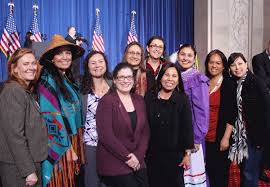DOJ Press Release, Feb. 6, 2014:
 “Three American Indian tribes – the Pascua Yaqui Tribe of Arizona, the Tulalip Tribes of Washington, and the Umatilla Tribes of Oregon – will be the first in the nation to exercise special criminal jurisdiction over certain crimes of domestic and dating violence, regardless of the defendant’s Indian or non-Indian status, under a pilot project authorized by the Violence Against Women Reauthorization Act of 2013 (VAWA 2013).
“Three American Indian tribes – the Pascua Yaqui Tribe of Arizona, the Tulalip Tribes of Washington, and the Umatilla Tribes of Oregon – will be the first in the nation to exercise special criminal jurisdiction over certain crimes of domestic and dating violence, regardless of the defendant’s Indian or non-Indian status, under a pilot project authorized by the Violence Against Women Reauthorization Act of 2013 (VAWA 2013).Rates of Violence Against Native Women
- Nearly half of all Native American women– 46 percent– have experienced rape, physical violence, or stalking by an intimate partner. (US DOJ)
- One in three Indian women will, at some point in her life, experience the violence and trauma of rape. (US DOJ)
- On some reservations Native American women are murdered at a rate more than 10 times the national average. (US DOJ)
- 86 percent of rapes and sexual assaults against Native American women are committed by non-Native American men. (Huffington Post)
VAWA 2013’s Attempt at Closing Loopholes
“The reauthorized act seeks to address part of the crisis by extending tribal jurisdiction over non-Native Americans who commit crimes of domestic violence or sexual assault against a Native American spouse or partner. Tribal governments in the US currently do not have jurisdiction over non-Native Americans who commit crimes on their land.
…
“Tribes must rely on the federal, or in some cases state, government to prosecute crimes by non-Native Americans that happen on their territory.
“But relying on federal or state authorities also often means having to travel hundreds of kilometres to the nearest forensic examiner or prosecutor – and federal prosecution of crimes on tribal land is rare.
“According to the Government Accountability Office, between 2005 and 2009, 67 percent of sexual abuse cases sent to the federal government for prosecution were declined. Justice Department officials told Al Jazeera the low prosecution rate is attributable to a lack of evidence, or issues with witnesses in the majority of cases.
“While the reauthorized version of VAWA is without a doubt stronger than previous ones, the provisions expanding tribal jurisdiction are still narrow. Tribes continue to have limited sentencing authority – up to three years, which could mean that some cases still are sent to federal or state authorities for prosecution. The new provisions are also geared towards targeting domestic or dating violence.” (Huffington Post, 3/10/13)
History of Racism & Oppression Against Native Women
“Jurisdictional loopholes are only one part of the equation, however.
“There is a history of racism and oppression for native women which makes predators think somehow we are vulnerable and that we’re not protected by the system,” said Sarah Deer, a law professor at William Mitchell College of Law in Minnesota and member of the Muscogee Creek Nation. “So you maybe have a hate crime component of this along with a jurisdictional problem.”
“While a large number of the sexual assaults against Native American women are perpetrated by non-Native American men, there are still many cases of domestic violence being committed by Native American males.
“Native women (traditionally) were always able to exercise political power and social power in their communities,” Deer explains. “That has been somewhat tempered by assimilation, where tribes have taken on some of the patriarchal stereotypes of American culture. When native men commit these crimes, they’re acting out against their cultural values.”
“Tribal advocates say the trauma of their ancestors has been passed down through generations, with painful memories still fresh: brutal and bloody wars, forced relocation and stolen land. There were also the boarding schools where many Native American children were forcibly removed from their families in an effort to assimilate them into white culture – and where sexual abuse is well-documented. Cultural traditions have been broken, tribal governments weakened.
“If we can replace the violence with our strong cultural values about women, I think we’ll start to stem the tide of violence,” says Deer. “We also need cultivation of tribal justice systems, so that tribes aren’t depending on the state government or the federal government to take action, but can take action on their own terms.” (Huffington Post, 3/10/13)
More Related Articles and Links:
- Three Tribes to Exercise Jurisdiction Over Non-Indian Perpetrators Under VAWA, Indian Country Today, 2/6/14
- Three Tribes Approved for VAWA Jurisdictional Pilot Project, Turtle Talk, 2/6/14
- Tulalip Press Release re: VAWA Pilot Program Selection, Turtle Talk, 2/7/14
- VAWA Passes: CTUIR may be ‘pilot project’ for implementation, Confederated Umatilla Journal, March 2013